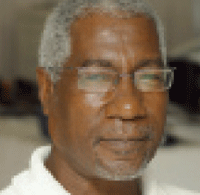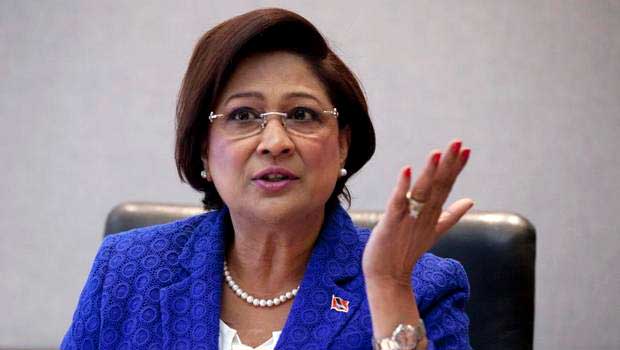
MONDAY’S preliminary election results in Trinidad & Tobago turned out to be pure ‘Ole Mas’ for Prime Minister Kamla Persad Bissessar’s People’s Partnership (PP) coalition:
• Her ruling PP had been defeated by the opposition People’s National Movement (PNM).
• Her alliance won more votes, but got less seats.
• Her own party in the alliance won more seats than it went into the elections with, while its United National Congress (UNC) partner lost most of its own.
• No other party (other than the PP and PNM) did well at the polls.
• Jack Warner’s Independent Liberal Party (ILP) failed to win a seat – not even his. But he said he’d achieved his primary objective of ‘taking Kamla down’ from her prime ministerial perch.
• The PNM has acknowledged victory, but is already warning that it will not be able to deliver on all its lavish promises, because they were based on when oil was twice its current price on the world market.
I can go on and on, but you get the point…
Thing is, though, what went down in T&T on Monday night is nothing new in Caribbean politics (or politics anywhere): voters voted and government changed. But an interesting question also arises (yet again): if the party that won the most votes lost the elections, is that truly what the majority of voters wanted? The same question came up when Al Gore won more votes than George Bush Jr, but Bush won that controversial US Presidential election after the Florida votes were discounted.
As we stand now, the British left us an electoral system just like theirs: the “first past the post” Westminster System that will allow a candidate to win by one vote, no matter how many are cast. However, in some other former British colonial jurisdictions in the Caribbean – like Guyana, for example – a ruling party that had problems with the razor-thin win by a single vote and changed the electoral system to one of Proportional representation (PR). This way, seats are allocated in parliament on the basis of the amount of votes won by each party, as there are no candidates. A party fields a Presidential candidate with a ‘List’ of persons from whom he or she who wins will form the next government.
The ‘first past the post’ system is being increasingly regarded in the former British colonies as nothing but an electoral horse race that simply leaves constituencies divided after each election, between happy winners and sore losers. The late great local bard and political thinker Hunter Francois identified and highlighted these deficiencies as they relate to Saint Lucia in his 1970s epic booklet proposing ‘A No-party State’. Today, the Constitution Review Commission (CRC) here too is recommending we dump the Westminster System and opt for a Presidential hybrid that will see the first-past-the-post system remain and the Governor General’s name be changed to President, with the Prime Minister still in charge.
So, with an election coming our way, what are some of the lessons from Trinidad & Tobago?
First of all, we have to be careful about which lessons we draw.
For example: Trinidad & Tobago’s 1.9 million voters were caught between parties engaging in ambush (Internet and other IT) marketing to get them to cast their ballots and a former President who called on them to go and ‘spoil’ their votes, vis-à-vis a former Prime Minister who said on the day before the election he still didn’t know who he would vote for. Is it the same here? And has ‘a protest vote’ (as already being proposed here by some) ever changed anything anywhere — for better or for worse?
Another example: The incoming PM is saying already that he can’t deliver on the promises in his party’s manifesto. Question: When did he discover that? Only after people had voted for those promises and swept him into office to deliver them? Not at all during the campaign?
And then there’s the race factor. Try as we may, many of us won’t fully understand the intricacies that belie the politics of race in Trinidad and Tobago and Guyana. No party openly actually promotes race as used to be the case not too far back in modern history. But parties originally built and kept in office on the basis of ethnic considerations have over the decades developed effective ways of playing the race card for and at elections.
In T&T, for example, KamlaPersad-Bissessar’s PNM opponents saw her less as the twin-island Republic’s first woman Prime Minister and more as the first ‘Indian’ woman to hold the post. On the other hand, the departures of ‘Africans’ Jack Warner and Winston ‘Gypsy’ Peters from Kamla’s ‘majority Indian’ Cabinet would have worked wonders for those in the PNM who sold them as ‘more proof’ that ‘Blacks’ or ‘Africans’ had no face or place in ‘Kamla’s Cabinet’.
Of course we do have Saint Lucians of both Indian and African descent, but the race card has never entered the elections race here, never mind recent misplaced low-level rumblings and ramblings on both sides of our local political fence. So, only lesson here (that I would advise) is that we should always avoid ever looking at the colour of people’s skins or the texture or their hair, not for politics, not for anything.
My final point on the T&T poll: Look at the cycle and sequence of general election results and their individual historical contexts here and across the Caribbean since the start of the 21st Century. Saint Lucian voters re-elected the SLP in 2001 and voted it out again in 2006, only to quickly bring it back in 2011. In T&T Monday, the PNM – the oldest party, founded by Dr Eric Williams – has been in and out of elections more than any other and is back again. In Guyana, the PPP and PNC have both changed their names and structures, but each has taken long turns in office, the new latter defeating the new former at the last poll. Same in Antigua last year St. Kitts and Nevis this year: traditional parties exchanged places as per normal.
Where all the aforementioned elections differ, however, is in the issues that have influenced the votes and resulted in the changes. To equate the Saint Lucia situation with any of the above can only be right or sensible if the local facts are the same in very other mentioned case. But try as I might, I haven’t seen similarities.
Finally, the last British elections so confounded the pollsters and their predictions that no one even dared to predict the T&T results on Monday, except to say it would be a close call. As it turned out, when the first-past-the-post results were tallied after the electoral horse race in the homeland of Ole Mas, the victory was more than ‘razor sharp’ – and certainly not as ‘neck-and-neck’ as the boldest of pollsters had predicted.
As it now turns out, MrsPersad-Bissessar and her PP partners say they will go to court to challenge the results, because the Elections Commission extended the voting by one hour, during which, she claims, the PNM gained enough votes to pass the PP at the finishing line on Monday.
By her account, the Commission shifted the election goalpost at the last minute, as if to specially facilitate her government’s exit. But the independent Commission says it has the constitutional power to do as it sees fit in any election — and it therefore has the legal and constitutional authority to do so.
And, if you thought the political carnival in T&T was over, former T&T Attorney General Ramesh Maharaj says the former PM and her PP have no case and is simply being “vexatious and frivolous”, behaving like a sore loser.
Now, that is Mas…














